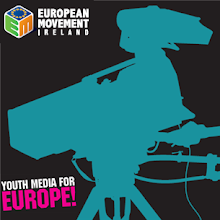By Katie Murphy
The previous weekend saw the 12th of July celebrations in full swing throughout the province. Many people prepared to host barbecues with their families, attend communal bonfires and anticipated watching the marching parades around various big cities and towns in Northern Ireland. For the most part, the 12 July celebrations passed without as much upheaval as in previous years and many a citizen of all sides of the community enjoyed a leisurely holiday weekend. Like most Northern Irish young people, the only connection I can make with the customary 12 July celebrations and Europe is that during this summer weekend many people travel to Europe in seek of a blissful holiday destination. Imagine my confusion when, on my travels around the city of Belfast, I noticed a European flag perched on top of a ‘boney’ or ‘bonfire’ with the intention of being burnt in a commemoration of the unionist win at the battle of the Boyne all those years ago.
It is common for a tricolor to be perched on top of such ‘bonfires’ to portray the unionist opposition to nationalism in Northern Ireland, but why on earth would the extreme unionist people wish to show any opposition to the European Union or other European countries? Are Northern Irish people suddenly anti-Europe? Are the unionist people displeased at the outcome of the recent European Elections in June? For those who are not aware, Sinn Féin candidate Bairbre De Brun received the highest number of votes in this years’ European elections in Northern Ireland, beating favourable Unionist candidates Jim Nicholson (UUP) and Diane Dodds (DUP). On the other hand could it be that Northern Irish people are opposed to European citizens seeking job opportunities in our country, following the racist attacks on the Romanian families recently that grabbed headlines around the world in June?
At this point I began to wonder if any voter in Northern Ireland, young or old, realised that the European Parliament is much different to the parliament we have constructed here in Northern Ireland, Stormont. For a start, the MEPs sitting in the European Parliament come from a wide array of backgrounds and hold a vast amount of different religious beliefs. The European Parliament is a culmination of people from different backgrounds who have come together to make laws to benefit Europe as a whole, taking into consideration the different views and cultures of every European citizen. I wondered if any voter in Northern Ireland realised that in the European Parliament your religious views or ethnic background do not determine your eligibility of being a good ambassador or voice for your country. For all that the European Union and European Parliament stand for, inclusiveness, togetherness and co-operation, I was baffled as to why any community in Northern Ireland would express opposition to the EU.
When my fellow Northern Irish correspondents and I were following the campaign trail in the run up to the elections, one of our big concerns was that our young people would adopt a sectarian approach to voting. After conversing with my fellow first time voters on the upcoming elections and the election process, many highlighted that people in Northern Ireland vote for the candidates who represent their religious community, rather than the candidate who is best for the job and who intends to work to benefit the community as a whole. Surely, for the European Elections at least, the Northern Irish people would realise that our political and religious struggles are irrelevant? Surely, they would realise that any candidate selected to go forward to represent our country in the European arena is there as an ambassador for every social and cultural group throughout the province, not just one? Why are our MEPs not stressing to the voting public that voting on the grounds of religion stifles the political process of our country and our full engagement with the European Parliament? I wondered if this sectarian approach to voting suited some of our running MEPs as it secured their votes and in turn, secured their position in the European Parliament. Why would they not attempt to appeal to all sides of the community and stress the importance of a united Northern Ireland in the European arena if they were dedicated to their cause and in establishing Northern Ireland’s voice in Europe?
Northern Ireland has the potential to become a great advocate for issues that are prevalent and up for debate in the EU such as human rights, workers rights and environmental protection, if we only rejected this ‘politics of division’ that tore our country apart.
Tuesday, July 21
Subscribe to:
Post Comments (Atom)










No comments:
Post a Comment